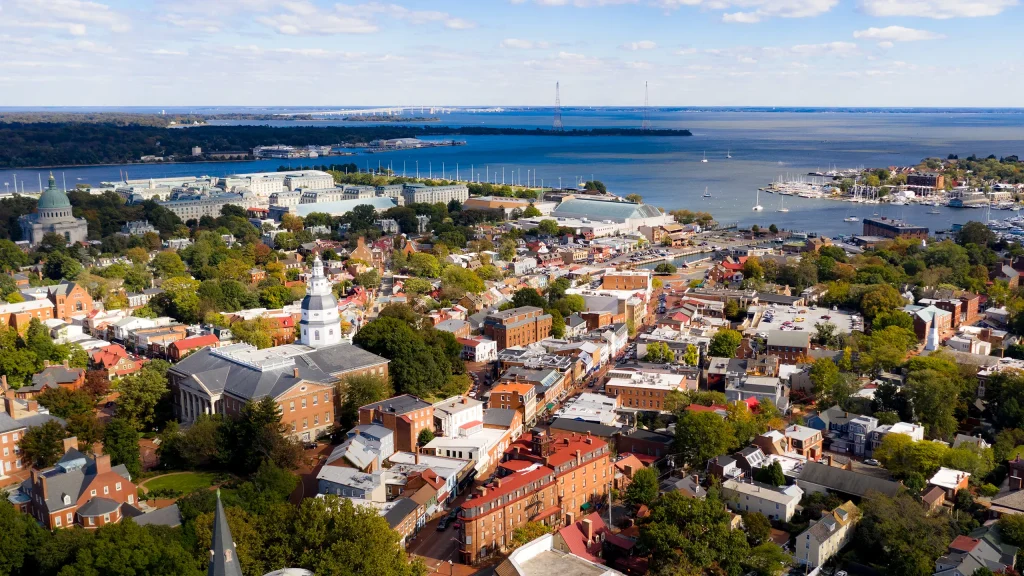Maryland at a Glance
6,164,660
$120,234
#2 in Quality of Education
Top 3 Industries: Aerospace,
Aquafarm, & Life science
The first step in having a successful home loan experience is finding the right mortgage lender.
Financing a home in Maryland can be an excellent investment, but it is important to choose the right lender to ensure that you get the best possible terms and conditions for your loan. There are many factors to consider when financing a home in Maryland, including interest rates, loan terms, and down payment requirements. Working with a reputable lender like NewFed Mortgage Corp. can make the process easier and more streamlined, as they have the expertise and experience needed to guide you through the homebuying process. NewFed Mortgage Corp. offers a variety of loan programs, including conventional, FHA, VA, and USDA loans, which means that they can help borrowers find the right financing solution for their unique needs. Additionally, they are committed to providing exceptional customer service and support throughout the life of your loan, which can provide peace of mind and help you achieve your homeownership goals in Maryland.
Maryland is a small state, but it offers a diverse range of communities and neighborhoods to suit different preferences. One of the best places to live in Maryland is Bethesda, an affluent community located just outside of Washington, DC. Bethesda offers a high quality of life, with excellent schools, a lively downtown area, and easy access to some of the region’s top cultural and recreational attractions. Another great place to consider is Annapolis, the state capital and a charming waterfront city that is steeped in history and culture. Annapolis offers a mix of urban amenities and small-town charm, with plenty of opportunities for boating, fishing, and other outdoor activities. Other popular options include Columbia, a planned community that offers a diverse mix of housing options and a strong sense of community, and Frederick, a historic city that boasts charming architecture, boutique shops, and excellent dining scene. With so many great places to choose from, Maryland is a great place to call home.
No matter what your mortgage-related needs, the NewFed team is ready to help. From your very first home loan to refinancing a property you’ve lived in for years, we are here for you. Our experienced and knowledgeable team is always ready to answer any questions that you have.
Mortgage Property Types

The most common property types available in Maryland are townhouses, single-family residences, and condominiums, but you’ll also find some manufactured homes, multi-unit properties, and cooperatives (co-ops). Let’s run through the definition of each.
Townhouses
This is a category of condominium that is distinct because each unit has multiple floors. They tend to be built in attached rows and have the same layout.
Single-family residences
This is most often freestanding homes on a piece of property, or independent residential structures that act as dwellings.
Condominiums
This is a real estate unit within a building (or multiple buildings) on a shared lot. Condo units are individually owned and may or not share walls (the detached version is usually differentiated as a condex). Most condominiums have a homeowners association (HOA) that collects dues to pay for maintaining the grounds and building exteriors and paying the property insurance premiums.
Manufactured homes
This is a prefabricated (“prefab” for short) home that was assembled from factory-built sections that have been trucked to the home site for the final construction. Once they’re finished, pre-fabs generally look like any other single-family home.
Multi-unit properties
These buildings have more than one separate and distinct living space for individual family units. Duplexes, which have two attached units, are quite common in Connecticut cities, as are small apartment buildings with three or four units.
Cooperatives (co-ops)
More common in cities, a co-op is a multi-unit residential parcel where the title is held by a legal entity. While the co-op’s residents build equity in the property by buying ownership shares, their names are not on the deed.
Refinancing

If you’re interested in revising or replacing the terms of an existing loan agreement, then you might want to consider refinancing. Usually, the decision to refinance is as simple as wanting to secure a lower interest rate, while another common motivation is to take advantage of the equity one has built in their property and convert some of it to cash. Some borrowers may even want to change the terms of their loan (for example, from a variable interest rate to a fixed), or to change the length of their loan agreement. Since loans with shorter terms usually have lower interest rates, the borrower can save a lot of cash by paying it off earlier and by paying less interest. Not only that, but refinancing is also a good way to bundle any outstanding debts into a single loan at a lower rate. For a more comprehensive overview of refinancing and what it entails, feel free to get in touch with one of our loan officers today.
Reverse Mortgages

Reverse mortgages are becoming increasingly popular among eligible people who are 55 or older. Essentially, a reverse mortgage is a special type of home equity loan that is available to homeowners 55 and up who have built up considerable equity in their primary property and want to draw it out as cash either monthly, as a lump sum, or as a line of credit. It’s a form of loan, and the money received is non-taxable and will be paid back when the mortgagee dies or sells the home. To find out more about reverse mortgages, check out our online overview.


